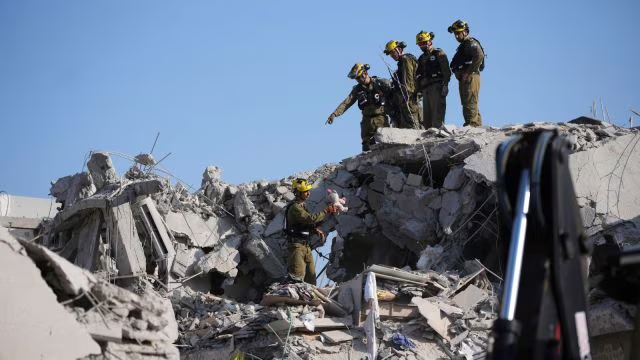
Israel Warns
On June 14, 2025, Israeli Prime Minister Benjamin Netanyahu issued a stark warning: Israel “will strike every site, every target of the Ayatollahs’ regime” in Iran. In a video address, he insisted that what Iran has felt so far “is nothing compared with what they will be handed in the coming days”
Netanyahu framed the strikes as a response to an imminent Iranian nuclear and ballistic missile threat. “We are operating forcefully to remove the two‑pronged threat to Israel,” he declared—targeting both the nuclear program and missile capabilities He claimed these military actions have set Iran’s weapons programs back by years, even acknowledging that senior Iranian scientists and missile commanders were killed
He offered assurance that Israeli air power has established total dominance, hinting at future operations: “Very soon, you will see Israeli aircraft … in the skies over Tehran”
Operation “Rising Lion” – Israel’s Deep-Strikes into Iran Israel Warns
Scope and Targets
Launched early June 13, Operation Rising Lion marks Israel’s most extensive military offensive against Iran in years. The Israeli Air Force sent five waves of aircraft attacking over 200 sites across Iran—nuclear and military facilities, including Natanz, Isfahan, Tabriz, Shiraz, and Iran’s uranium reconversion center
According to the IDF, more than 330 munitions were dropped on around 100 targets, including high-ranking IRGC commanders, nuclear scientists, air-defense batteries, missile complexes, and advanced drone launchers. A Mossad-coordinated drone operation reportedly helped neutralize Iranian air defenses, ensuring Israeli jets initial air superiority
Damage and Casualties
Iranian state media reports at least 78 killed and 320 wounded, including dozens of military personnel and nuclear specialists, though Western sources cite higher figures . In response, Iran fired around 200 ballistic missiles and drones into Israel, killing at least three civilians and wounding dozens—some reports suggest as many as 150 casualties, including seven Israeli soldiers
Tehran Strikes Back – Missiles, Drones, and Global Fear
The IRGC dubbed the counter-strikes “Honest Promise 3.” Explosions were reported across Tel Aviv, Jerusalem, and the central region. Air‑raid sirens sounded as Israeli defense systems intercepted many Iranian attacks, though some projectiles struck civilian zones
An Israeli defense official highlighted that the main international airport in Tel Aviv is temporarily closed as a precaution
Political & Diplomatic Fallout
On the Ground
Netanyahu expressed condolences to affected cities—Tel Aviv, Rishon LeZion, and Ramat Gan—reportedly speaking with their mayors to offer government support to bereaved families
Tehran’s Response
Supreme Leader Ayatollah Khamenei called the Israeli offensive a “crime,” warning of a “bitter and painful fate” for Israel if it continues. Iran’s Deputy Foreign Minister confirmed withdrawal from scheduled U.S.‑Iran nuclear talks in Oman, claiming they were “meaningless” amid military escalation
Global Reactions
- United States: Backing Israel’s right to self‑defense; assisted Israel with missile interceptions. Former President Trump urged Iran to resume negotiations—but affirmed continued support for Israel .
- Europe: UK Foreign Secretary called the strikes “alarming”; Germany voiced concern about broader regional stability; France, along with Turkey and Russia, urged de-escalation
- China & Russia: Both called for restraint; China warned against involvement from third parties; Russia offered to mediate .
Regional & Economic Ripples
- Oil prices soared by over 10%, with markets jittery over potential disruptions through the Strait of Hormuz
- Humanitarian concerns have intensified across the region, with Gaza witnessing halted aid deliveries and civilian casualties—a UN‑led summit on Palestinian matters was postponed
What Comes Next?
Netanyahu’s ominous vow—“we will strike every site and every target of the Ayatollahs’ regime”—signals Israel’s readiness for potentially prolonged military engagement in Iran
Iran’s leadership has vowed continued retaliation, threatening wider regional action—including against Western military bases in the Gulf
Diplomatic efforts hang by a thread. Nuclear talks appear indefinitely shelved, while Western powers scramble to prevent full‑scale war. Israel’s and the U.S.’s allies urge calm, but both officials and analysts warn that tensions are nearing a breaking point—with risks of a broader Middle East escalation.
📝 Summary
What began as a strategic strike has spiraled into a high‑stakes confrontation between Israel and Iran. Netanyahu’s campaign has struck deeply into Iran’s military‑nuclear infrastructure, prompting fierce missile‑and‑drone retaliation. With both sides digging in and Western diplomatic channels faltering, the world faces the ominous prospect of a wider, more protracted regional war.
Thanks For Reading